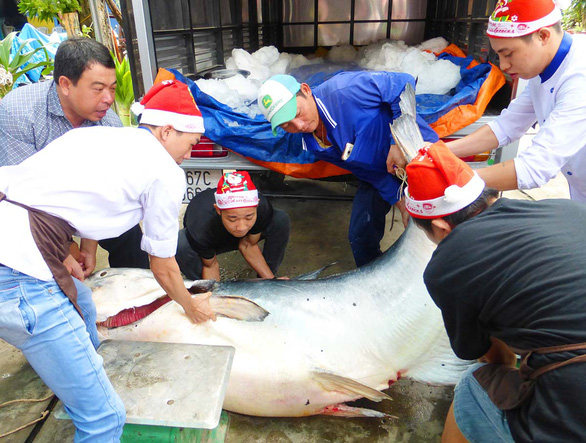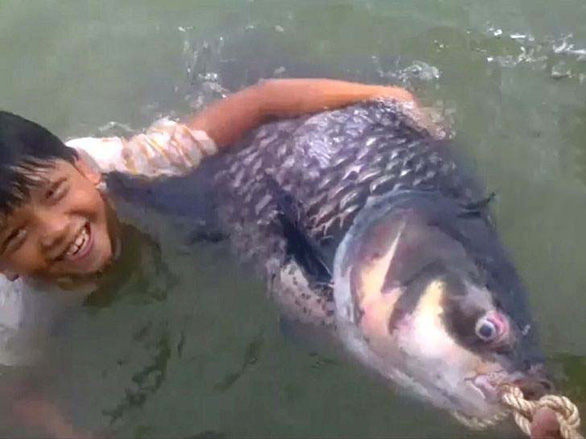Hoang, the fourth-generation diving fisherman in his family, is known in his hometown of Pho Ba Islet in Long Xuyen City as Ba Hoang, or Hoang the Otter, thanks to the abundant fishing experience he has built up over the years.
Fishy dedication
On a typical working day, the 54-year-old angler spends hours plunging into local waterways with just a diving rope wrapped around his body and an air hose between his teeth.
Hoang begins each fishing session by dragging his ‘chai’ – a type of fishing net popular in the Mekong Delta – through the water while his wife holds the other end of the hose aboard a sampan and helps him pull the net.
Hoang’s father, Ba Lung, is a seasoned diving fisherman credited with being the first on the islet to build an apparatus for diving.
It is also his father that Pho Ba Islet is named for, after the man migrated to the area from Phnom Penh, Cambodia and began to earn his living by diving for fish.
|
|
| Lam Van Hoang receives tempting offers from traders for his lucky catch, a ca tra dau (Mekong giant catfish), in this supplied photo. |
Hoang began accompanying his father on fishing trips when he was just a child, eventually becoming so engaged in the work that he began taking fishing trips of his own.
Nowadays, he is known throughout the region for his unmatched diving skills.
“No one can dive as deep as me and bring in as many giant fish as I do,” he said.
Hoang is such an adept fishmen that the he can tell with ease which fishing grounds will bring in the biggest fish on any given day.
“I can catch giant fish with just two tries. Most of the others can only bring in a small batch after casting their nets 10 more times,” he explained.
Pointing to a cast net placed in a corner at his home, Hoang shared that it trapped a ca ho (Giant barb) in the Hau (Back) River five years ago.
“I groped for the giant trapped in my net while diving with eyes closed. It was so strong that I thought I was facing a crocodile or a spiky ca tra dau gai [Mekong giant catfish],” he recalled.
Hoang managed to pull the 40-kilogram river monster ashore after a strenuous battle and help from three other people. He was able to sell the fish to a nearby restaurant for VND750,000 (US$32) a kilogram.
Hoang and his wife are constantly on the lookout for new fishing grounds in neighboring provinces, including Dong Thap, Long An, Vinh Long and Soc Trang, with many of their trips lasting anywhere from several days to a few months.
Years ago, the couple would cast their nets twice a day, with Hoang diving 20 to 70 meters down for 15 minutes to two hours depending on how highly populated the fishing area was.
During such times, he began to develop a reputation in the community for the massive fish he was bringing in.
On one particular trip to Moc Hoa District in Long An Province, Hoang caught four ca bong lau (Pangasius krempfi, a type of catfish), each of which weighed more than 10kg.
He also caught a 19.5-kilogram ca ngat (Gray eel-catfish) in Soc Trang Province.
According to Hoang, much of his success comes from truly understanding various fishing grounds throughout the Mekong Delta region.
“Fish typically build nests in the center of rivers. I usually take a dive and cast a net around the nests and pull them ashore,” he shared.
“There’s no room for errors, otherwise the schools can slip away.”
Hoang added that he uses a special method to distinguish between different kinds of fish while diving with his eyes closed.
“Ca suu [Smallscale croaker] and ca coc [Soldier river barb] make distinctive sounds while ca tra [Shutchi catfish] has a long torso and flat head and ca vo [Giant pangasius] has a short torso with a small tail,” he said.
“Many don’t believe that I know what the fish are until I prove them wrong after hauling in the nets.”
The good old days
Now that Hoang is in his mid 50s, he believes the days of diving 100 meters below the surface or hauling in two catches a day are long gone.
|
|
| A ca ho (Giant barb), which weighed nearly 40 kilograms, got tangled in Lam Van Hoang’s net five years ago. |
He has seen dwindling catches in recent years due to overfishing and a failure to protect young populations of fish and promote their reproduction.
According to Hoang, his daily income fluctuates greatly depending on his luck.
“Ten years ago, fishing was a boon. We usually ended up with big catches and could easily pocket VND10 million [$430] or more each catch.”
Now, he is lucky to bring in four or five kilograms each day, earning him just VND200,000-400,000 ($9-17), barely enough for him, his wife, and their two grandchildren to get by.
Despite his passion for fishing, he has asked his two sons not to follow in his footsteps.
“My younger son can earn around VND1 million [$43] each day, much more than what we do now,” he said.
Hoang added his younger brother, also a professional diving angler, dives for shipwrecks.
Accidents have been few and far between during his decades on the job.
“I always dive alongside the opening of the net and rise to the surface immediately if I sense that something is wrong,” the man said.
Despite the difficulties of the work, Hoang has no intention of quitting anytime soon.
His wife, 53-year-old Bui Thi Dam, supports his decision to keep going and plans to keep joining her husband on his fishing trips.
“It’s really hard work, especially for women like me, but we’ll keep trying,” she shared.
Like us on Facebook or follow us on Twitter to get the latest news about Vietnam!






